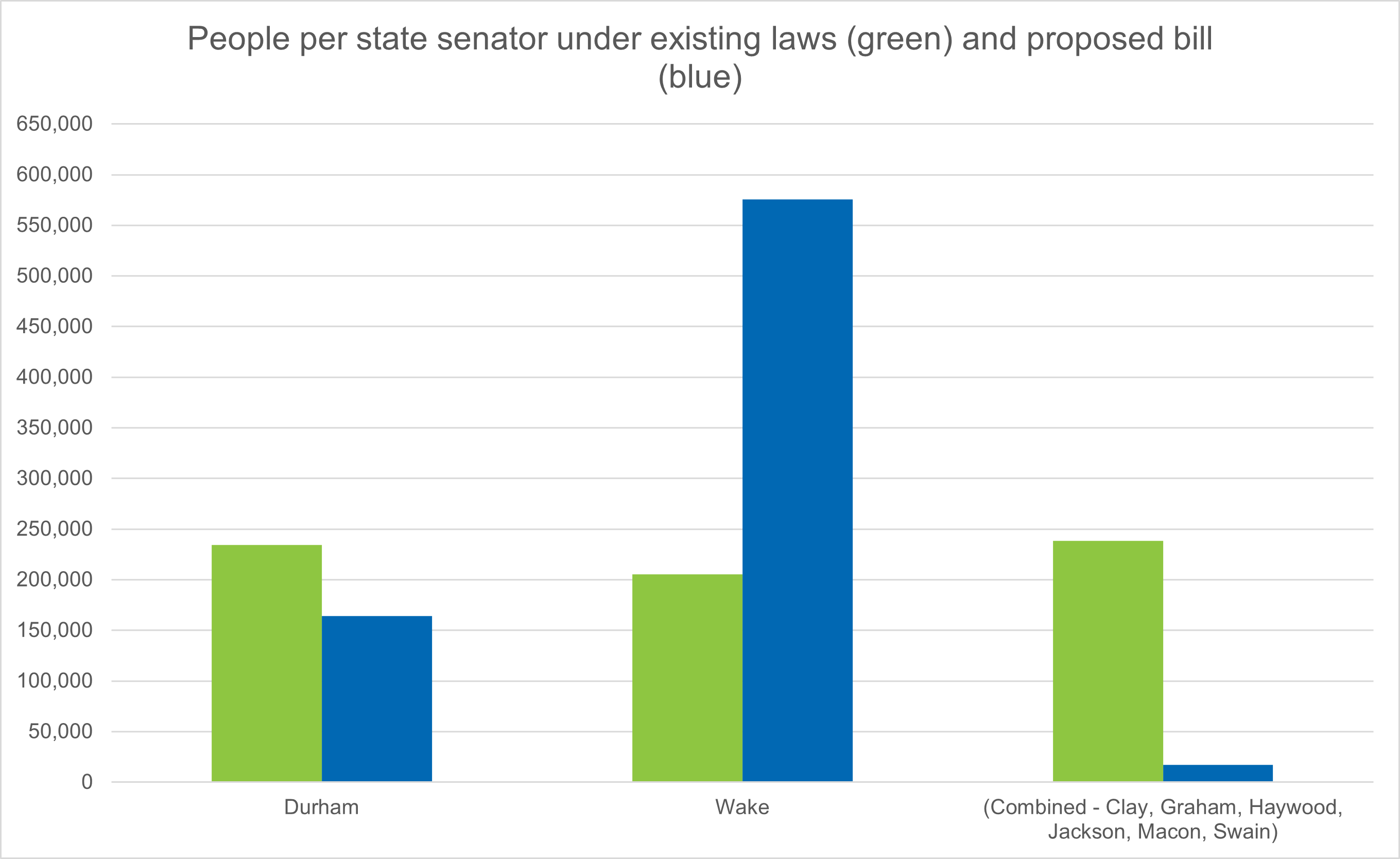A wackadoodle bill calls for a constitutional amendment that there be 100 counties in NC, and that each state senator represent exactly two counties (not, as is required now, an approximately equal number of residents).
First, some legal history
One of the bedrock principles in American democracy is the idea of “one person one vote.” In the seminal Supreme Court case Reynolds v. Sims, which established that the principle of one-person one-vote applied to state legislatures, Chief Justice Earl Warren noted that “the right of suffrage can be denied by a debasement or dilution of the weight of a citizen’s vote just as effectively as by wholly prohibiting the free exercise of the franchise.”
Moreover, “if a State should provide that the votes of citizens in one part of the State should be given two times, or five times, or 10 times the weight of votes of citizens in another part of the State, it could hardly be contended that the right to vote of those residing in the disfavored areas had not been effectively diluted.”
In the wake of Reynolds, state legislative districts are required to be roughly the same size.
State legislative districts are required to be roughly the same size
North Carolina has 100 counties. We have 50 state senate districts. These are distributed by population size.
For example, Wake County, North Carolina’s largest county, holds 1,150,722 people, about 11% of the state’s population. Wake therefore has about 11% of the state’s senators – there are 5 senators who represent parts of Wake County, and one senator who represents part of Wake County and all of Granville County. One fifth of NC’s population lives in its five largest places.
Meanwhile, there is one senator who represents Cherokee, Clay, Graham, Haywood, Jackson, Macon, Swain, and Transylvania counties, which together have 238,366 people, about 2.2% of the state’s population. Currently, there is one senator for every 238,366 people in these counties. And there is one senator for every 234,255 people in Wake County.
It’s not perfect, but the math works out so that right now, the person/senator ratio is pretty even across the state. That does not prevent gerrymandering, but it does impose some limits on how radically the state legislature can be slanted.
Now Republicans want to radically reshape how NC apportions its state senators
However, the Supreme Court has been chipping away at some of its prior decisions upholding voting rights, including the effective dismantling of the Voting Rights Act about ten years ago. A group of Republican state legislatures seems poised to encourage even more rollback, with a new bill that would propose an amendment to the state constitution that would radically reshape how North Carolina apportions its state senators.
The bill calls for the state senate to contain 50 senators, as today, with each representing two of the state’s 100 counties. Population wouldn’t be relevant. The constitution currently says the each senator should “represent, as nearly as may be, an equal number of inhabitants, the number of inhabitants that each Senator represents being determined for this purpose by dividing the population of the district that he represents by the number of Senators apportioned to that district.” The proposal would eliminate that requirement.
What would that mean for NC?
Let’s see how that would impact the composition of the state Senate. As of 2021, Durham and Wake County have about 1.48 million people. Together, they have eight senators, six who represent the entire county, and two who represent Durham or Wake and a second county. Under the proposal, Durham and Wake combined would have two.
Meanwhile, 46 other counties that include about 1.38 million people would have 23 senators. Tyrell County and Hyde County, if they are paired,have about 8,200 people. They would have as many senators as Wake County, population 1.1 million. The value of each voter’s vote in Tyrell and Hyde Counties would be 148 times the value of a Wake County’s resident’s vote. Cherokee, Clay, Graham, Haywood, Jackson, Macon, Swain, and Transylvania counties, which currently are represented by one senator for its 238,368 residents, would be represented by 14 senators.

This is a terrible bill, and unfortunately, it is sponsored by nine Republican House members, including two members of the leadership. Under current law, it is flagrantly unconstitutional, but no doubt the sponsors are hoping that a sympathetic Supreme Court will use it as an opportunity to overturn decades even more long-standing law, as it did with the Dobbs decision last June.